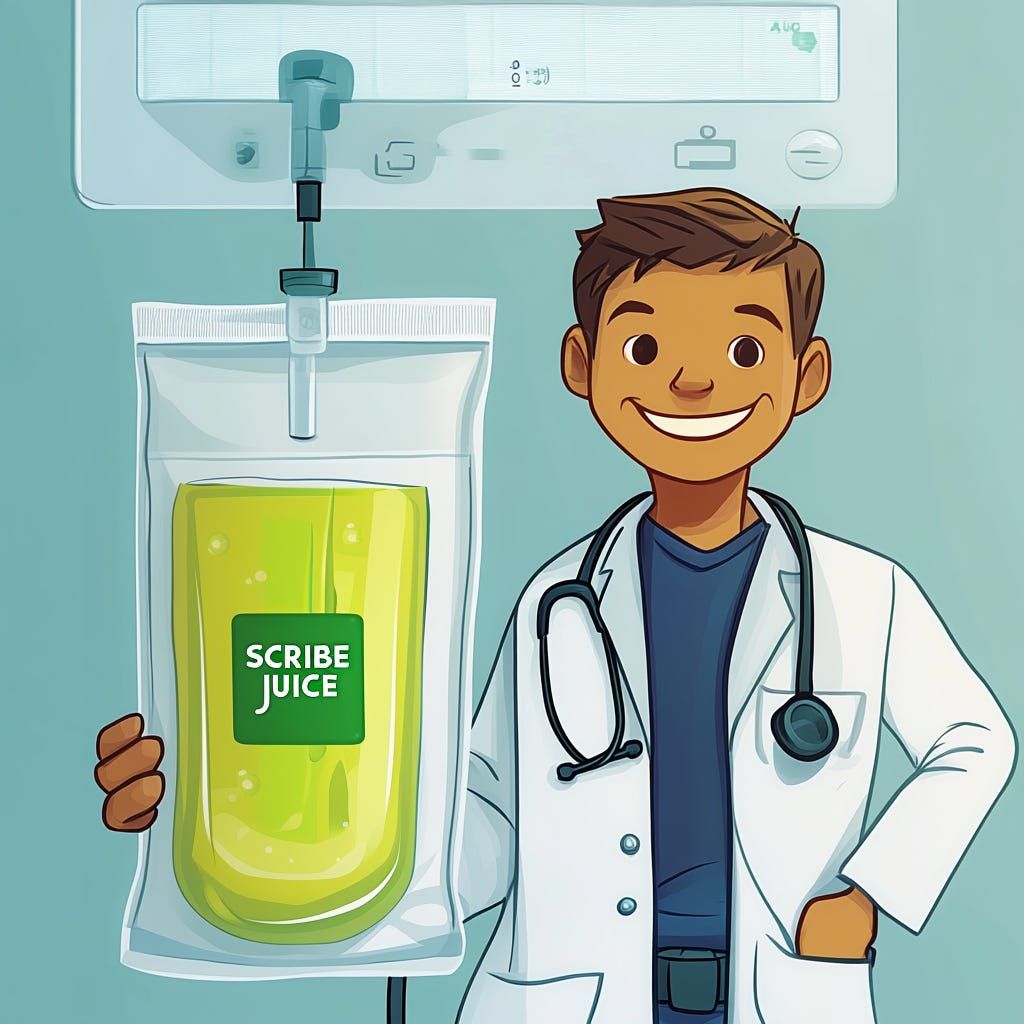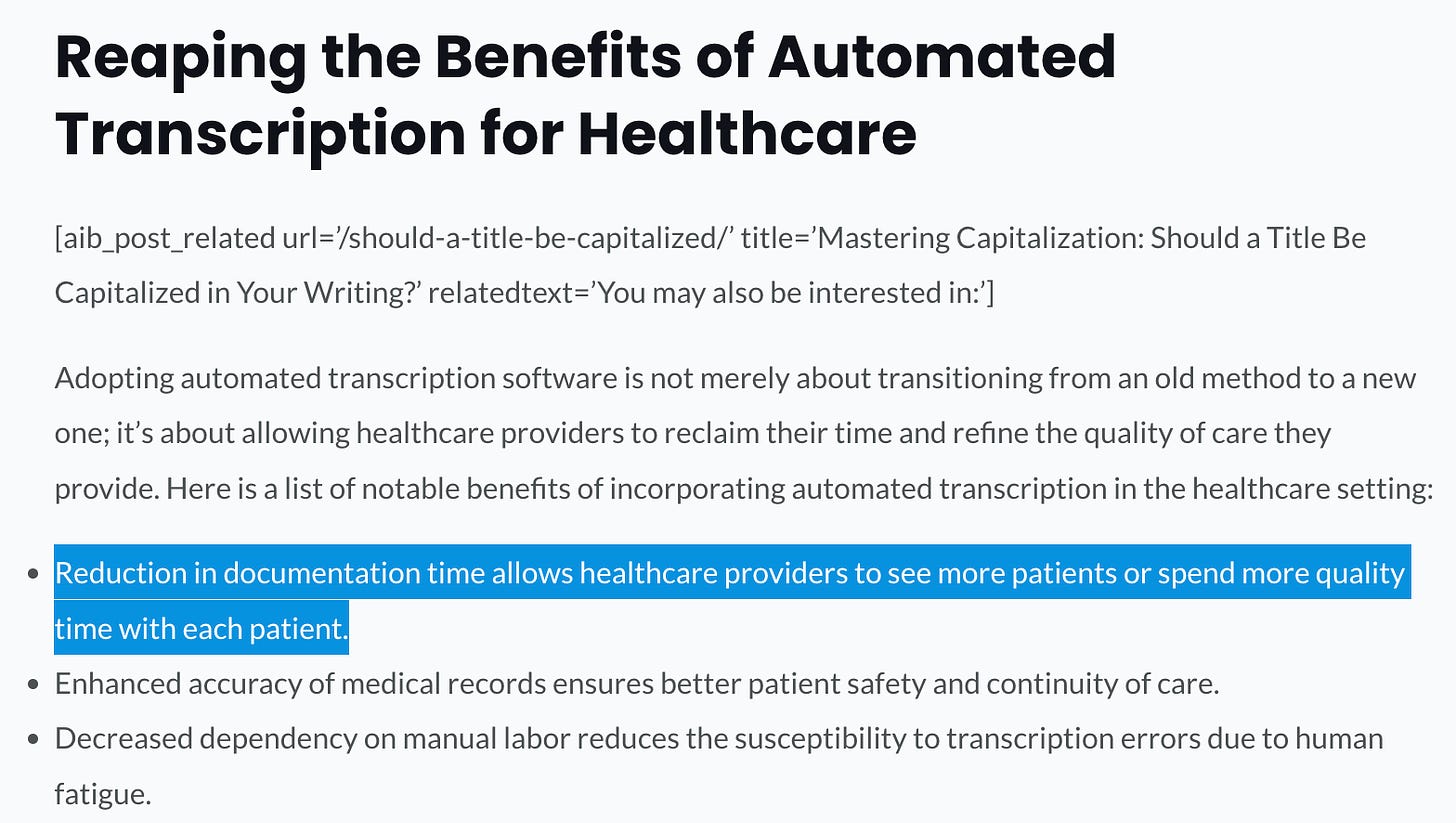AI Medical Scribes Are the Juicero of Healthtech
I want to bring some clarity to this post. AI scribes are marketed as tools to benefit doctors and patients, promising improved care and significant time savings. While these promises may briefly hold true, the efficiency gained will inevitably be quantified and absorbed by the system—whether through metrics imposed by insurers, administrators, or other entities. The promotional videos make it clear: this is not a gift to physicians or patients. Large language models indeed have enormous potential in medicine, offering prosocial applications that enhance effectiveness, not necessarily efficiency. It's important not to conflate or interchange these two concepts.
I can’t even describe how upset I was. After clinic, I stormed through the door, tossed my stethoscope to the ground, and collapsed onto the couch. My dog tilted his head, watching in confused silence as I buried my face in my hands and sobbed.
What set me off? An interview with the founder of ScribeMD, an AI scribe platform, on the Backtable Urology Podcast. These words triggered my existential spiral:
CEO of ScribeMD, “a little bit pissed off” / craves “human touch”
If I had become the proverbial payphone, then resisting was futile. I had to kneel before ScribeMD and its brethren1. Understanding would be the first step toward healing. So, I turned to Google, searching permutations of terms like “ScribeMD” AND “Revenue Cycle,” “Payment,” “Efficiency,” and so on. Unsurprisingly, the promotional material was adamant that this was designed to benefit physicians.
More Quality Time with Patients
Professional Empowerment
Enhancing the Quality of Care Delivered
Powerful stuff.
I don't mean to pick on ScribeMD. I’m seeing more and more of these ads on socials like Instagram and TikTok with platforms promising doctors will be able to reclaim their time with AI scribes. They've ostensibly reconciled the irreconcilable. Maybe the tides are turning. It wouldn’t be the first metaphysical event in 2024 that we never thought possible.
Worst game of never have I ever that I’ve ever played. We find a way to ruin everything.
I would scoff at the idea of such a paradigm being possible within a healthcare system that commodifies health. Any incremental increase in a clinician's free time will inevitably be tracked and quantified on a Power BI dashboard.
We need to get ahead of this and avoid what I call the MD Tech Spiral of Death. Here’s how new technology typically integrates into the existing structure:2
Phase 1: Skepticism and resistance of new technology. ("The Ostrich Phase")
Phase 2: New technology replaces existing procedure anyway ("The Bulldozer Phase").
Phase 3: Physicians see the power of the technology and it enhances their practice and satisfaction ("The Honeymoon Phase" )
Phase 4: There is a failure to contextualize and constrain the technology as it degrades physician quality of life and patient care ("The Trojan Horse Phase”)
I’ve spent countless hours working with these tools, and their power never fails to amaze me. In the hands of a physician, NLP and LLM models hold a clear value proposition that could genuinely benefit the collective. There’s a scenario where these benefits are equitably shared, rather than disproportionately favoring one node in the healthcare equation. Notably, in this vision, LLMs wouldn’t necessarily reduce documentation time—but they would meaningfully enhance the quality of care we provide to patients.
That said, it’s still early days. AI scribes haven’t been fully “priced in” yet—they’re essentially still crawling around in poop-filled diapers. These platforms need time to mature, hit developmental milestones, and maybe even secure a Series B funding round before they’re ready for primetime.
It feels like ScribeMD, DoximityGPT, and similar platforms are pitching the idea that a zero-sum scenario can still thrive as they scale. Profits and people. Killing three birds with one stone. Everyone gets to have their cake—doctors, patients, and ScribeMD alike.
I scoured their promotional blog for any acknowledgment of this paradox but found none. Then, I stumbled across this soundbite:
Conjunction junction, I see you. Here’s the full clip:
Finally, "human touch" and hyuge exits, living in harmony, as we always knew they could.
Initially published September 18th, 2024.
All essentially indistinguishable products built on GPT-4.
Historians of medicine may recognize this phenomenon from the EMR and telehealth movements of the past.
But maybe it doesn't actually matter who is driving. Can we be trusted behind the wheel?
"Just as environmental ethics holistically constrain industrial capabilities within sustainable planetary boundaries, an ethical realignment reasserting healthcare's sacred duties as a non-commodifiable public commons must rationally contextualize and constrain technological applications - not inversely let runaway commercialized dystopia of health as a castrated market service be encoded into tools of societal self-destruction.
The path begins not with integrating generative AI into existing institutions, but disentangling healthcare from the financialized logic of profit extraction through a civilizational philosophical reboot. Only by asserting an ethical posture recognizing healthcare as a universal human right transcending market contingencies can technological capabilities be justly incorporated in maximizing human flourishing as an end in itself. To myopically build in service of today's contradictions is to instrumentalize innovations in our philosophical and spiritual unmaking. We must pause, reckon with ideological incoherence, and realign - lest tools of immense liberatory potential merely be conscripted to hasten injurious retreat from our most sacred callings."
~ From a rousing exchanging with ChatGPT on the topics ~





